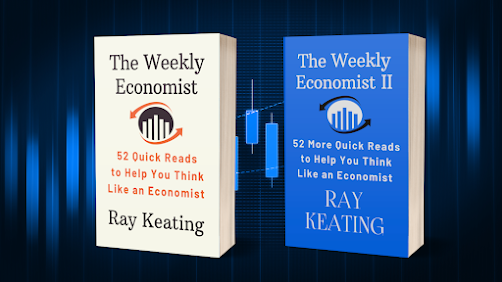Ray Keating’s Second Book in Series Offers More Quick Reads on Topics and Questions Related to Economics and Business
Ray Keating, a leading economist on small business and entrepreneurship, has written a new book titled The Weekly Economist II: 52 More Quick Reads to Help You Think Like an Economist. This is the second book in an ongoing series, with the first being The Weekly Economist: 52 Quick Reads to Help You Think Like an Economist.
When listening to talking heads or politicians, people are legitimately bewildered about how the economy actually works and how to think about critical issues. The Weekly Economist and now The Weekly Economist II offer quick reads on topics essential to thinking clearly on economics and business, and for assessing the often wild assertions heard from politicians on such matters.
Ray Keating notes, “There’s a great deal of misguided and misleading talk about the economy, business, and public policies. Applying sound economic thinking to such matters is critical for our country and the world. With the second book in The Weekly Economist series, I’m hoping that people will take at least a few minutes each week to read these short essays, and by doing so, become a light for clear-eyed thinking of matters critical to economic growth and our quality of life.”
The Weekly Economist and now The Weekly Economist II hold appeal for a general readership looking to become more informed citizens. And they’re ideal for the classroom, boardroom and workplace.
Praise for The Weekly Economist II…
"An accessible, wide-ranging compendium. Keating remains remarkably impartial here, offering fair critiques and reasonable assessments of economic decisions, theories, and policies across time. This is an impressive second installment of the author's economics essays, avoiding repetition from the first collection, and offering cogent advice that feels more timely than ever." - Self-Publishing Review, ★★★★
Praise for The Weekly Economist…
“Reading Mr. Keating's new book is worth more than a degree in economics from most universities. Sensible and accessible, The Weekly Economist is a veritable catechism of how to think economically.” - Fr. Robert Sirico, author of The Economics of the Parables and President Emeritus of the Acton Institute
“If you want a quick and accurate insight into the major topics in economics, and if you have little or no background in economics, Ray Keating's The Weekly Economist is the book for you. Turn to any page and you'll find tight clear reasoning that will help you understand the complicated economic reality around you.” - David R. Henderson, editor, The Concise Encyclopedia of Economics
“For those who are curious about economics but who may not be interested in tackling a dry 300-page economics textbook, Ray Keating provides a brilliant alternative - a weekly breakdown of 52 economic concepts everyone should be familiar with. Although designed to give one easily digestible theme a week, many readers will undoubtedly want to binge-read to see which topics are their favorites. Great information for those new to economics or as a weekly refresher.” - Bryan Riley, Director, National Taxpayers Union Free Trade Initiative
“a lively primer” - Gene Veith, Cranach: The Blog of Veith, and author of God at Work: Your Christian Vocation in All of Life
“An accessible and comprehensive guide to concepts that regularly baffle the average person. This book runs the gamut when it comes to economic issues, and will invariably help readers think more critically about the financial machinery that runs the world. Keating makes a subject as potentially dry as economics into something dynamic and interesting. A natural storyteller, he carefully dissects an intimidating sphere of modern existence into a book that nearly anyone could learn from and enjoy.” - Self-Publishing Review, ★★★★
Paperbacks and Kindle editions of The Weekly Economist and The Weekly Economist II are available at Amazon.com, and signed books at www.RayKeatingOnline.com.
Review copies, and author interviews and appearances are available upon request.
Additional praise for Ray Keating’s work…
“Keating is at his best when tackling the issue that introduced him to the world of conservative thought: the benefits of the free market.” - Kirkus Reviews
“Keating is no sour-puss conservative... Keating’s pro-growth agenda of dramatic supply-side tax and regulatory cuts, school choice, and much smaller government stands as New York’s only chance at rebirth.” - Steve Forbes
Ray Keating's “take on the economy is unabashedly supply-side, offering a clear understanding that risk taking and entrepreneurship are the engines of economic growth.” - Jack Kemp
“A common-sense explanation of why politicians and bureaucrats shouldn't throw sand in the gears of global trade.” - Dan Mitchell, Chairman, Center for Freedom and Prosperity, about Free Trade Rocks! by Ray Keating
Contact: Ray Keating
E-mail: raykeating@keatingreports.com
Facebook: www.facebook.com/freeenterpriseeconomics
Twitter: @FreeEnterprise7
RayKeatingOnline.com














